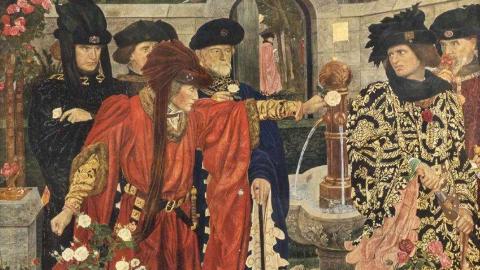The notion that public matters were off limits to the religious was cowardice, an indolence of the soul. There could be no possibility of moderation on...'the national sin': slavery.
Simon Schama
GOD'S WILL
John Brown had believed himself on a mission from God and previous rebel slaves, Denmark Vesey and Nat Turner, also claimed to be fulfilling God's will. Historian Simon Schama see's the South's response as two pronged. They argue 'that the slaves were from such a savage culture that they were far better off in the rice fields of Savannah than the African savannah.' The South also cites the Bible noting that God himself must condone slavery because the Hebrews had them.
But it's the abolitionists who seem to have God on their side. And this being America, they often have guns by their side as well. Thomas Wentworth Higginson is a Unitarian minister and a Union army colonel. He wears the clothes of a minister but keeps a revolver in his belt. A necessary precaution as when he's not preaching about the evils of slavery, he's running guns to the slaves. Schama describes the followers of the evangelising abolitionist Theodore Weld as 'the shock troops of the new crusade...men with the Bible in the saddlebag next to the shotgun.'
It's religion that first shames the South. But it wouldn't be rebellions, or religion that would prove the slave-owners undoing. It was their runaway slaves.
THE FUGITIVE ACT
In the first half of 19th century, over half a million slaves are sold in a business worth $2 billion to the Southern economy. A healthy black male costs around $1000 to buy; a woman $800; a child $500. Runaway slaves cost money. And about a thousand a year escape into the North. In total, nearly 60,000 slaves will escape at a cost of $50m loss to their owners. They escape along the so called 'underground railway'. Their most famous accomplice is an escapee herself, Harriet Tubman. She carries opium, to quieten the babies of fleeing mothers, and a pistol. The slaves are under no illusion that before she lets them be recaptured, she will use the pistol on them, and then on herself. The South puts a reward of $40,000 bounty on her head.
So in 1850, the Fugitive Act is passed. The North sees it as a concession to the South for admission of the territories won in the Mexican War into the Union as non-slave states. It enables owners to come North and requisition their 'property'. A runaway's only hope is that a federal magistrate rules them a free-man and untouchable. But federal magistrates receive $10 to declare someone a slave, and only $5 to rule they are free. But having humans hauled away before their eyes forces the North to confront the conditions from which the slaves are running. In 1852, millions read the novel 'Uncle Tom's Cabin' and are shocked by the life a slave must endure.
Did you know?
Scars across a slave's back were considered evidence of an unruly or rebellious spirit and hurt his sale
Solomon Northup, enslaved in 1841, Uncle Tom's Cabin by Harriet Beacher Stowe was the best-selling book of the century (after the Bible.) A lot of the readers were, for the first time, women, empowered by working and earning in the new textile factories.
















